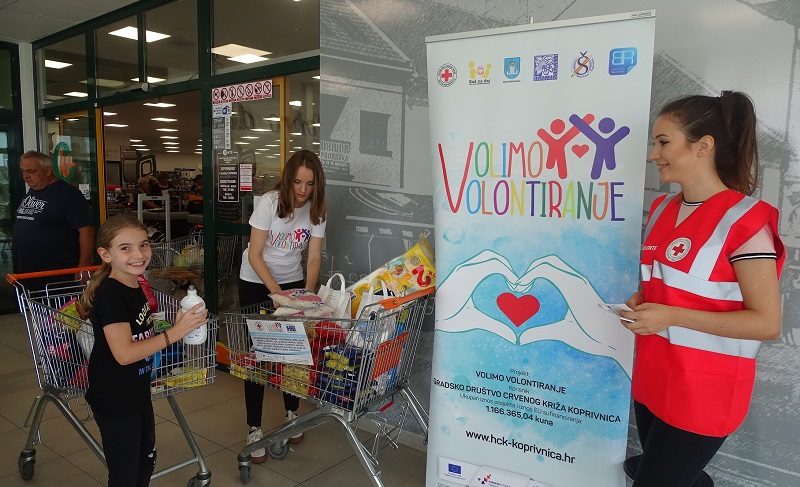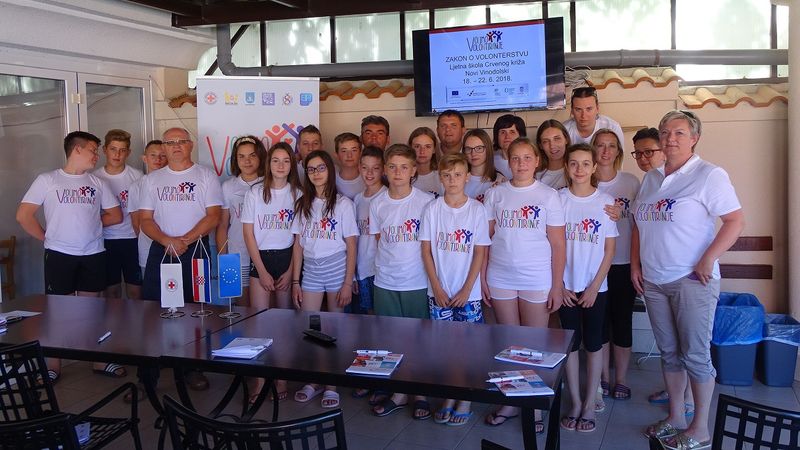Mali humanitarko - Investing in the next generation of volunteers
Since Croatia joined the European Union in 2013, the Croatian Red Cross has established a variety of activities that connect EU policies and programmes with its work to improve well-being in the community. Many local Red Cross branches are offering assistance, aid, and care in cities and villages across the country. One of them is located in Koprivnica, a northern town not far from the border with Hungary, where Red Cross workers have created a series of projects to enhance local NGO cooperation and to strengthen the skills of volunteers in charge of social assistance for people in need.The 'Socijalna košarica' (Social Basket) project received an award for the best local EU project in Croatia 2016/2017.
© Red Cross of Koprivnica
The ongoing ‘Volimo volontiranje’ (We love Volunteering) project is being implemented in close cooperation with the volunteering organisation „Rad na dar“ and local elementary schools. Both projects received financial support from the European Social Fund (ESF). Another project is also underway with Swiss support, this time aimed at future generations of volunteers. We asked the director of the Red Cross city branch in Koprivnica, Adela Sočev, to tell us more.
Adela, we hear the Koprivnica-Križevci County branch of Croatian Red Cross launched the ‘Mali humanitarko’ (Little Humanitarian) project. What is it about?
The project is implemented by the Red Cross branch of Koprivnica-Križevci County in partnership with city branches of Koprivnica, Križevci, and Đurđevac, as well as the elementary schools in Koprivnički Ivanec, Ljudevita Modeca Križevci and Molve. The objectives are to strengthen partnerships between schools and the local community. By raising awareness of sustainable development, the project promotes the strengthening of competences and the active participation of children and young people in the sustainable development of our community.
One of the project cornerstones is a methodology we want to implement in lessons on humanity in elementary schools, as part of citizenship education. It will teach students about the importance of humanitarian assistance and volunteering. We hired project staff who have developed the materials in cooperation with partners and external experts. The next step will be to work in the schools in the area of Koprivnica-Križevci County and deliver the lessons to fifth grade pupils (aged 11).
When will you start the activities with the children? Who will get a chance to participate?
This Spring, we began establishing groups with at least five students in three partner schools. Participants will get a chance to learn about the history and current activities of the Red Cross, for example in the areas of human trafficking and discrimination. They will participate in a visit to the Red Cross education centre in Zagreb. We provide every school with a laptop and a camera, so the students can record and document all their activities. The groups from the various schools will meet this summer on the island of Pag for the ‘Little humanitarian’ training. The students, their mentors, and staff of the partner branches will spend five days learning about humanitarian work in the global context, children's rights, the importance of community service, sustainable development, and the ecological aspects of humanitarian action. We then aim to organise 50 events across Koprivnica-Križevci County. But transport is an issue in our region, so we will provide the groups with a Red Cross car for the students to reach the different venues.
© Red Cross of Koprivnica
You mention the activities in the schools shall be part of citizenship education. What does “citizenship education” mean in the Croatian school context?
Citizenship education is implemented as a school activity that promotes non-violence, tolerance, and solidarity. It is about developing values based on acceptance, the inclusion of diversity, and respect for human rights, as well as an understanding of the role of civil society.
This sounds very interesting. Are the teachers also involved in your activities?
Teachers are also involved in activities, especially in the partner schools where they will lead the 'Little humanitarian' student groups. Other teachers will get access to the teaching materials so they can be used for citizenship education with many more student groups in the future.
When students have completed their participation in the school project, and they become more interested in humanitarian work, can you offer them a follow-up activity?
Students will gain knowledge of humanitarian work. They will be able to organise or engage in humanitarian groups primarily in their schools, and will also familiarise themselves with the work of their local Red Cross branch. We hope to see many students join our branches and actively participating in humanitarian activities in the future.

© Red Cross of Koprivnica
We hear it can get difficult for voluntary organisations to find new recruits. How common is it in Koprivnica-Križevci to sign up for volunteering? And how long do the volunteers stay with you?
The current projects help to increase recognition of volunteering in our region. They also enable the Red Cross to be identified as voluntary organisation. The citizens appreciate our work in assistance to the elderly and people in poverty. Volunteering actions are acknowledged when they are about really helping those in the community who need support. What helps is that volunteers tend to stay with us for many years. We do have a lot of pensioners who dedicate their time to serving the community. With the creation of volunteer groups in schools, we also atract young people who show an increasing interest in volunteering. Now it is up to us to keep them committed to the activities.
Investing in future generations of volunteers is a visionary ambition. What do you think the future activities of civil society organisations will be about?
The task of civil society organisations will be to help older people, to prevent the institutionalisation of social services, and to expand the social services network in the community by providing support to people at risk of poverty. Out of these, I think that assistance to the elderly will become a real challenge; they need our support and care in everyday life, day in, day out. To provide these services, we rely on young volunteers who are responsible, committed, and actively participating in a wider community of civil society organisations working together. With ‘Mali humanitarko’ we aim to engage many future volunteers who will, in a few years, take charge of our work.

© Red Cross of Koprivnica
To implement the 'Socijalna košarica' (Social Basket) project and the ‘Volimo volontiranje’ (We love Volunteering) project, the Red Cross branch of Koprivnica-Križevci received financial support from the European Social Fund (ESF). For more information visit ESF in Croatia.
To develop the ‘Mali humanitarko’ (Little Humanitarian) project, the Red Cross branch of Koprivnica-Križevci received financial support from the Swiss Contribution Fund, specifically the Framework Agreement between the Swiss Federal Council and the Government of the Republic of Croatia on the implementation of the Swiss-Croatian Cooperation Program to reduce economic and social inequalities within the enlarged EU. For more information visit Swiss-Croatian Cooperation Program
For media inquiries, please contact Eva Oyón on: eva.oyon@redcross.eu or +32 2 235 09 22

